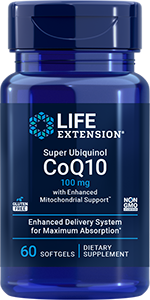
Newsletter
Newsletter
Low Magnesium, High Homocysteine Levels Associated with Genetic Damage

A recent study of healthy middle-aged adults found that having low blood levels of magnesium or high levels of homocysteine was associated with an increase in DNA damage markers. Study participants who had both low magnesium and high homocysteine levels had a significantly higher incidence of two of these markers.
The findings were reported on June 12, 2024, in the European Journal of Nutrition.1 “Although study participants were healthy at the time of sampling, the increased DNA damage in people with low magnesium levels can cause accelerated tissue aging and make them more susceptible to aging-related diseases such as Alzheimer’s disease and cancers,” authors Varinderpal S. Dhillon and colleagues at the University of South Australia remarked.
Magnesium is essential for hundreds of functions in the body, including efficient DNA replication and repair. Homocysteine is an amino acid which, when elevated in the blood, is associated with an increased risk of cardiovascular disease, congestive heart failure, Alzheimer’s disease and other conditions. In previous research, the current study’s authors uncovered an association between higher homocysteine and lower magnesium levels.
The researchers also found a significant association between higher magnesium levels, lower homocysteine and greater levels of folate and vitamin B12. Higher folate and B12 concentrations were associated with a reduction in one marker of DNA damage.
“The results obtained from our study indicate that optimal intake of micronutrients such as magnesium and B vitamins that can lower homocysteine concentration is essential for maintaining genome integrity for healthy aging,” the authors concluded.
Products
Apply What You’ve Learned: DNA Damage
- Our genes are made of DNA. This molecule provides the instructions for building and maintaining our bodies.
- "DNA damage” means a change to the DNA’s chemical structure that prevents it from functioning properly. Although the body has repair mechanisms, they are not always effective. Unrepaired DNA damage is linked with disease and signs of aging.
- Environmental toxins and other factors damage DNA. A flavonoid known as xanthohumol derived from the hops plant helped inhibit DNA damage in human studies.2,3
- Other DNA-protective nutrients include zinc; watercress; the carotenoids beta-carotene, lutein and lycopene; vitamins B12, C and E; folate and more.4-8
References
- Dhillon VS et al. Eur J Nutr. 2024 Jun 12.
- Pichler C et al. Cancer Prev Res (Phila). 2017 Feb;10(2):153-160.
- Ferk F et al. Mol Nutr Food Res. 2016;60(4):773-86.
- Sharif R et al. Mutat Res. 2012 May 1;733(1-2):111-21.
- Fogarty MC et al. Br J Nutr. 2013 Jan 28;109(2):293-301.
- Zhao X et al. Am J Clin Nutr. 2006 Jan;83(1):163-9.
- Kaźmierczak-Barańska J et al. Nutrients. 2020 Nov; 12(11): 3364.
- Fenech MF et al. Adv Nutr. 2023 Nov;14(6):1337-1358.
Featured Life Extension Magazine® Article
The Hidden Power of Mushrooms
By Heather L. Makar
Adding mushrooms to the diet, especially in place of red or processed meat, has been linked with longer life. An amino acid known as L-ergothioneine found in mushrooms is believed to be a reason for mushrooms’ longevity benefits.
Although ergothioneine is not made in the human body, our bodies have dedicated transporter proteins that deliver the L-ergothioneine we consume to the body’s cells. Ergothioneine has been shown to lower oxidative stress, slow the shortening rate of the cells’ telomeres and enhance DNA repair.
Read Full Article
What's Hot
Health Concern
Nutrient Combo Lowers Homocysteine
Results from a trial reported on January 30, 2023, in the European Journal of Nutrition revealed a significant reduction in homocysteine among generally healthy adults with hyperhomocysteinemia (high plasma homocysteine levels) who received low doses of folic acid, vitamin B6, vitamin B12, trimethylglycine (TMG, also known as betaine) and zinc.
Related Life Extension Magazine® Articles

Overlooked Risks of Elevated Homocysteine
High homocysteine blood levels contribute to cerebrovascular disease, brain aging, and hearing loss. A simple blood test and specific B vitamins can safely lower homocysteine.

Tocotrienols Prevent DNA Damage and Combat Aging
Human studies show that tocotrienols reduce DNA damage and have been shown to help protect against common age-related ailments.
Life Extension Magazine® Issue Now Online
A remarkable number of healthy-longevity findings have been published over the past 18 months.
The latest news on aging, nutrition, and vitamins
Health News
AMPK Metabolic Activator (item #02207): This supplement should be taken in conjunction with a healthy diet and regular exercise program. Individual results are not guaranteed, and results may vary.





